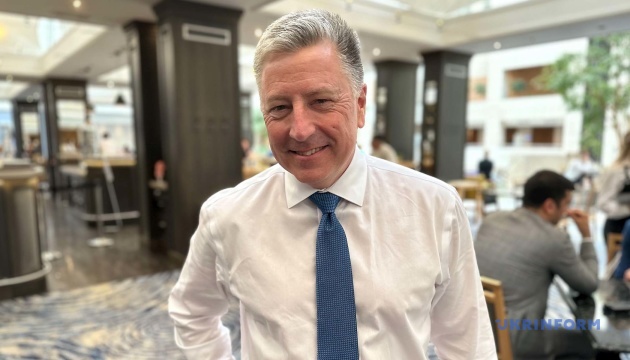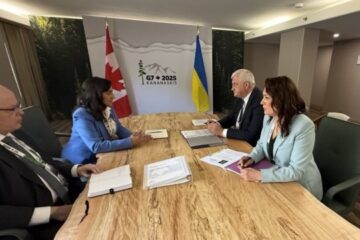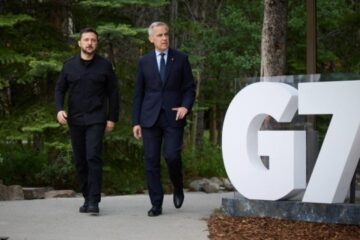U.S. President Donald Trump is hesitant to put pressure on Russia because he still holds out hope of bringing Putin to the negotiating table. At the same time, he is increasingly frustrated that things are not going according to his plan, and may apply the “Iran scenario” to Russia.
The American leader is also frustrated with Ukrainian President Volodymyr Zelensky, yet he simultaneously admires his stance.
Ukraine is likely to continue receiving weapons from the U.S., but only on a paid basis, because Trump thinks in terms of deals. However, with Putin’s mentality, no deal is possible. The only thing that could stop the war is Russia’s inability to finance it; otherwise, there will never be peace with this ruler.
Until the fighting ends, Trump is not expected to visit either Kyiv or Moscow.
These were the thoughts shared by American diplomat Kurt Volker, who served as the U.S. Department of State’s Special Representative for Ukraine Negotiations from 2017 to 2019, in an interview with Ukrinform.
ENDING THE WAR IS ONE OF TRUMP’S PRIORITIES
Q: Mr. Volker, is it thinkable that President Trump might lose all interest in negotiating over Ukraine and Russia, and simply withdraw—consequently stopping the delivery of arms to Ukraine, with or without money?
A: I don’t think so. Ending the war is a high priority for President Trump. He’s said it many times. He’s very frustrated that it’s not going his way—that Ukraine, the U.S., and Europe have all said, “Let’s stop the fighting. Let’s have a ceasefire,” but Putin doesn’t want to do it. That’s very frustrating for him.
He’s being told by many, many people that he needs to increase pressure on Putin. But he doesn’t want to do that because he believes that if he does, it’ll be harder to pull Putin into a deal.
I think what he’ll do is similar to what he just did with Iran. He told the Iranians: “Cut a deal, cut a deal, cut a deal.” They didn’t—and then Israel struck. And he said, “I told you so. You should’ve cut a deal.”
I think it’s the same now with Russia. He’s got the Senate—84 members, which is a lot—ready to sponsor legislation to tighten sanctions, including secondary sanctions on Russia’s oil, gas, and financial sectors. And he can’t override that with a veto.
So I think he can give them the green light and say, “Go ahead and do it.” And he can tell Putin, “Look at what I’m dealing with. This is what’s behind me. I gave you every opportunity—take it and stop this war. Otherwise, I’ll have to impose these sanctions.”
Q: What about recent reports that Trump’s team has been calling senators, asking to make that sanctions package prepared by Lindsey Graham and others less strict?
A: I’ve only just heard about that. And my guess—and I haven’t seen what was actually said—is that the Trump team is asking for a national security waiver. So, if the President determines that it’s in the national interest not to implement certain sanctions, he can waive them.
Frankly, that’s standard. Every administration asks for that. This isn’t unique to Donald Trump. Now, he may be doing this because he wants to keep a free hand—maybe he doesn’t want to impose the sanctions at all. It allows him to use sanctions as a negotiating tool.

TRUMP THINKS EXCLUSIVELY IN TERMS OF DEALS
Q: But the deadline seems to keep moving… So what would be the red line—when he finally says, “That’s it, the Senate has a free hand”?
A: Unfortunately, I don’t think he thinks in those terms. He thinks in terms of the deal. He wants to end the war, get a long-term agreement, and have America—have Donald Trump—get credit for it.
He’s not going to get emotional or suddenly say, “Okay, new policy.” He’ll keep playing it out, maybe slowly increasing pressure on Putin. I do think he’ll allow Ukraine to buy weapons—yes. But I don’t think there will be any more taxpayer money for Ukraine.
Q: So, arms for money?
A: Yes. I think he’ll be happy to see American industry supported—to sell weapons, sure. He’s fine with that. But he doesn’t want to use taxpayer funds to do it. So I don’t see any restrictions on the arms themselves.
In fact, during his first term, when I was the Special Representative, we talked about Javelins. The only issue he raised about lifting the Obama-era arms embargo and providing lethal equipment to Ukraine had nothing to do with the weapons being lethal. It was simply: “Will they pay us back?” It was just about the transaction. But letting them buy the arms? No problem.
My recommendation to members of Congress and the Senate is: pass legislation authorizing Ukraine to borrow the money from us and pay us back later. That doesn’t cost the taxpayer anything. We can offset it against the minerals deal—so we can say it’s paid for. Let’s get that done. And I think Trump would be fine with it—as long as he can say, with a straight face, that this is paid for. Ukrainians are buying it, and the money goes to the U.S. defense industry. He can sell that.
THERE WILL NEVER BE REAL PEACE WITH PUTIN
Q: You’ve also said you don’t believe in peace in the near future…
A: I don’t believe there’s any real peace with Putin. Ever. He has this absolutist, false historical and political narrative, and a desire to eliminate Ukraine—its national identity—and pretend it’s always been just Russia. So, he won’t agree to anything other than that.
So no, I don’t believe in peace—not with that mentality. He means war.
But I do think you can get a ceasefire.
Q: By the end of this year?
A: I hope so. Yes.
Q: Under what conditions? What would make him agree not just to a symbolic three-day pause, but something more serious?
A: He needs to run out of money.
Right now, he thinks he can ride this out. He’s planning a summer offensive. He’s evading sanctions, still selling oil. He’s waiting to see whether the Trump administration is serious about sanctions—or whether the West will get tired. He thinks he has time.
But if his foreign exchange reserves fall to around $10 billion and keep dropping, he won’t want to threaten the Russian state’s solvency. It’s just that he won’t be able to run the country without money. There’s no military threat to overthrow Putin —no regime change, no “color revolution,” no nuclear standoff.
And then, I think, he’ll find a way to say: “As a goodwill gesture, we’re implementing a 30-day pause in fighting to let Ukrainians evacuate from the areas where they should not be.” Something like that.
Q: But Ukrainians wouldn’t go for that.
A: Of course not. But he’ll invent a narrative.

NO ‘MINSK-3’
Q: You were a special envoy during the Minsk agreements. Is there a danger of a Minsk-3 or something like it?
A: We don’t need another Minsk. And there won’t be a real agreement. So we shouldn’t worry about that.
We need to stop the fighting, and put in place measures that show we have more strength than Russia—so that we deter any future attacks. That’s what we’ll need: political, economic, military. Once the shooting stops, we need to reinforce our side of the wall so it doesn’t start again.
Q: With American weapons too?
A: American weapons. Ukrainian soldiers. European security guarantees. Maybe even a European force deployed in Ukraine for training, equipment, and air defense. All of it—with American backup.
Q: On the issue of envoys: hasn’t this all gone wrong from the start? Two envoys instead of one, Moscow rejecting Kellogg and getting its own… Are there too many people involved, and nothing is happening?
A: Right. Nothing is happening. And the only real decision-maker is Trump.
I wouldn’t pay too much attention to whether it’s Kellogg or Witkoff or Rubio or anyone else. Trump is going to make the calls. And he really wants a deal. He wants a negotiated settlement. So he’ll keep trying.
But I say this with high confidence: Putin will never agree to a deal. He’ll just keep raising demands, expecting people to keep giving him things—without him ever giving anything in return.
TRUMP BOTH LIKES ZELENSKY AND IS FRUSTRATED WITH HIM
Q: Isn’t the situation also complicated by the fact that Trump, it seems, simply doesn’t like President Zelensky?
A: I actually think Trump likes Zelensky. In my view, he appreciates that Zelensky didn’t try to undermine him during the impeachment. He admires Zelensky standing up for his country and being a great salesman and getting the world to provide support to Ukraine. But he’s frustrated with Zelensky, because Trump just wants to stop the killing, to stop this.
But he’s also frustrated with Zelensky—because Trump just wants the killing to stop. And he got the impression, through many conversations, that if we keep giving Zelensky weapons and ammunition, Ukraine will just keep fighting. And Trump doesn’t want that. He doesn’t want to give weapons for that reason. He’ll sell them—if Ukraine agrees to stop the fighting.
Q: It’s a vicious circle…
A: It is—because it’s not within Zelensky’s power to stop the fighting. But they’ve had a few chances to talk since that Oval Office meeting. And I believe they now have an understanding: Zelensky knows that if there’s a ceasefire, Trump will accept it. And Trump, knowing that Zelensky is on board with that, is now ready to say: “Okay, you can buy the arms you need. Borrow the money, find the funding—just be ready to act if Russia says, ‘We’re ready for a ceasefire.’”
And I think that’s actually a decent position for both sides to be in. I think that’s okay.
Q: Is it thinkable that Trump would visit Ukraine during the war?
A: No. No. No. He won’t do that. He wants to preserve his ability to talk to Putin, and his ability to talk to Ukraine. He wants to stay above it. He says almost every day, “This isn’t my war. I didn’t start this war. This is Biden’s war.” He’s not going to visit.
Q: Could he visit Russia?
A: I don’t think he’ll meet with Putin until there’s a ceasefire.
Again, I could be wrong—but I think that would mean giving away a major deliverable. A bilateral meeting with Putin, a summit-level discussion, while the war is still ongoing? No. His goal is to stop the war, and if Putin doesn’t stop it, I don’t think there will be a meeting.
Olga Tanasiychuk, Ukrinform
Photos provided by the author
Source: Kurt Volker, former U.S. Special Representative for Ukraine Negotiations




